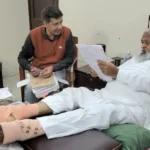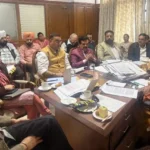Chandigarh, July 22:
As 80 percent of Dengue cases have been reported from urban areas, the Health Minister Mr. Balbir Singh Sidhu instructed all the Stakeholder departments of the State Task Force to strictly implement the preventive measures to control the outbreak of Dengue, Malaria, chikungunya, and other vector & waterborne diseases.
While presiding over the meeting of the State Task Force, the Health Minister said that role of the local government department is to ensure the spray of insecticides and larvicides for prevention and control of Dengue in the urban areas. Similarly, Rural Development and Panchayats department can support in prevention of mosquito breeding by spray of larvicides in perennial ponds, seeding of larvivorous fishes in the ponds in the rural areas. Awareness generation through village health and sanitation committees can be very helpful in the prevention of vector-borne diseases.
He said that the Department of Transport and Roadways can ensure that discarded tires are either condemned or stored properly so that these tires should not be the mosquito’s breeding sites. He said that the department of Fisheries can provide technical support to district hatcheries where breeding of gambusia has been done.
Mr. Sidhu instructed the Department of Medical Education and Research to ensure a separated dengue ward in all medical colleges and its blood bank should have sufficient stock of blood and all diagnostic equipment and machines should be functional. The department also ensures that Malaria should be treated as per the “National Drug Policy of Malaria”.
Considering the important role of the Education Department to spread awareness, he said that school children can participate to sensitize people for prevention of vector-borne diseases and early reporting of the child with fever, rash or any other such symptoms to prevent the outbreak of communicable diseases like chickenpox, measles, mumps etc. He said that these guidelines must be shared with all government and private schools.
Pointing out the maximum cases of dengue that have been reported from the migrant populations, the Minister said that the Labour Department can share mapping of migrant population/labors/ brick kilns so that the health department can plan special screening and surveillance drive of these areas. Indian Medical Association can appeal to private practitioners to follow national guidelines for the treatment of communicable diseases and should report all the notified diseases to the government.
Mr. Sidhu informed that 8345 dengue cases and 22 deaths were reported in State in 2020 and during the current year till July 20th total of 72 dengue cases has been reported. He said that with the concrete efforts of the Integrated Disease Surveillance Programme no death due to dengue has been reported to date and in the last 2 years no chikungunya cases have been reported in State.
Health Minister said that State and District level teams of IDSP have been doing outstanding job and they have played a key role to control the spread of coronavirus and other outbreaks across the State.
Sharing the data of Malaria Elimination drive, Principal Secretary Health Mr. Hussan Lal said that no death due to malaria has been reported since the last 5 years in Punjab. He said that Malaria cases have been drastically reduced and only 109 cases reported in 2020. It was also informed that Punjab State is the first State to introduce a Malaria treatment card to ensure monitoring of the complete radical treatment.
Representatives from stakeholder departments viz Local Government, Rural Development and Panchayats, Water Supply and Sanitation, Water supply and Sewerage Board, Transport, Roadways, Animal Husbandry, Fisheries, Medical Education and Research, Education, Labour, Indian Medical Association were present in the meeting.










